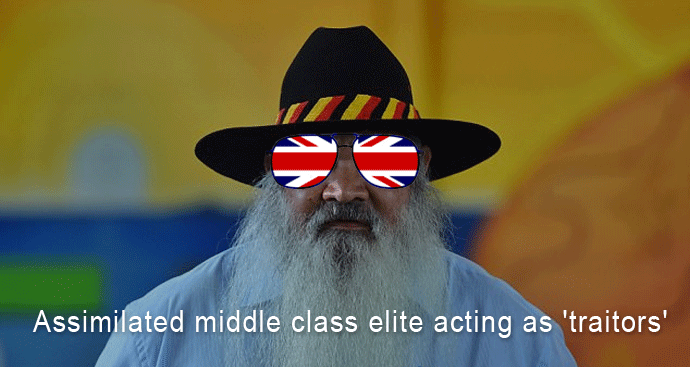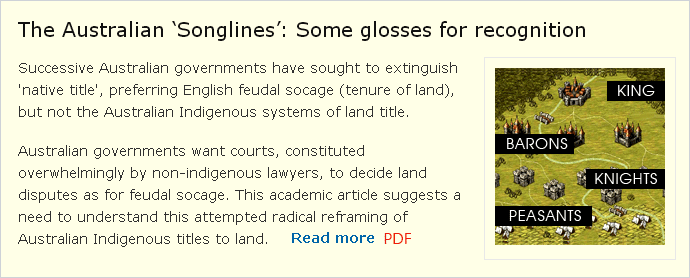Dispossession of First Nations maintained by archaic land tenure system


Ghillar Michael Anderson 2 October 2020
The announcement on 30 September 2020 of the approval for the Santos coal seam gas extraction in the Pilliga reflects the many ways the colonising power overrides First Nations, this time it's the Gomeroi/Kamilaroi Nation. 850 gas wells are proposed in the Pilliga, where our ancient Stories are now threatened in the place we call Girraween, Place of Flowers - created for the purpose of ensuring that we have a sustainable seedbank for our ecological systems within the eastern states. It also holds the Gomeroi creation site of the Kangaroo and Emu - the most iconic cultural figures which give meaning and life to our moiety system of Emu and Kangaroo.
On the environmental side, it is an established fact that CSG drilling into the underground waters brings up 'bugs', micro-organisms, and heavy metals that pose and enormous threat to the surface ecology and people. This has been proven by past accidents within the Pilliga CSG areas formerly operated by Eastern Star Gas, which had the majority shareholder of John Anderson, former Deputy PM to John Howard. The extent of the damage was never exposed publicly but Santos revealed to the first Gomeroi Applicant group that, after purchasing the major share in the Narrabri coal seam gas project, Santos had to clean up the pollution from some of the gas wells. The pollution was unbelievably dangerous in that 'bugs', micro-organisms, had come to the surface and were destroying the soil so that it became powdery, like moon dust. The only way Santos could halt the process was to dig up the polluted soil and cart it away. To this day we do not know exactly where it was dumped. Maybe someone would like to investigate this further.
The CSG wells are also an attack on the underground waters, which is a direct attack on our spiritual protectors of Mother Earth - attacks of equivalent spiritual trauma to the destruction by Rio Tinto of the caves at Juukun Gorge belonging to the Puutu Kunti Kurrama and Pinikura Peoples in WA.
It is an uphill struggle to protect Homelands from the extraction industries. One of the hidden agendas for destroying the original NSW Aboriginal Legal Service was to stop them from running test cases on the question of sovereignty, land and natural resource ownership.

Applicants and claimants are now at the mercy of the Native Title Services, whose agenda appears to be to steer communities into agreeing to mining etc for a small royalty and perks. We witnessed this with Santos. When the first Applicant group of 19, elected by a Nation meeting of over 600 claimants, kept asking too many hard questions of Santos, e.g. How can you guarantee the integrity of the bore pipes in an earthquake zone? NSW Native Title Services (NSW NTS) - allegedly we have to say - fomented disunity to the degree the first group of applicants was displaced by a second group after legal wrangling in the courts, where NSW NTS refused to hand over documents. Now we are yet to see the final agreement between Santos and the second group of Gomeroi Native Title applicants, if there is one, but the Narrabri CSG is approved by the NSW government and authorised by the Federal Minister for Environment.
We now need to back track to understand better how this exploitation of First Nations' resources is manipulated and the way we are being dispossessed in this latest wave of colonial greed.
A corner piece of former Prime Minister, John Howard's, legacy is FEUDALISM.
What do we mean by 'feudalism'? It is the application of an extinct land-holding policy that is defunct in Britain, but was conveniently relied upon by the full bench of the High Court in the Mabo Case:
It is not surprising that the fiction that land granted by the Crown had been beneficially owned by the Crown was translated to the colonies and that Crown grants should be seen as the foundation of the doctrine of tenure which is an essential principle of our land law. It is far too late in the day to contemplate an allodial or other system of land ownership. Land in Australia which has been granted by the Crown is held on a tenure of some kind and the titles acquired under the accepted land law cannot be disturbed. [emphasis added]1
The 'tenure of some kind' is feudalism. It is the application of an extinct land-holding policy that is defunct in Britain, but was conveniently relied upon by the full bench of the High Court in the Mabo Case:
It is not surprising that the fiction that land granted by the Crown had been beneficially owned by the Crown was translated to the colonies and that Crown grants should be seen as the foundation of the doctrine of tenure which is an essential principle of our land law. It is far too late in the day to contemplate an allodial or other system of land ownership. Land in Australia which has been granted by the Crown is held on a tenure of some kind and the titles acquired under the accepted land law cannot be disturbed. [emphasis added]
The 'tenure of some kind' is feudalism. This is inconsistent with Attorney-General v Brown [1847] which is referred in Mabo, but the High Court judges failed to include the crucial part of the case, which stated:
'First, the title to lands in this colony is in the Crown; equally on constitutional principles, as by the adaption of the feudal fiction. Such a title, on either ground, is fatal to the idea of the allodium. Whether the term implies a property acquired by lot, or a conquest, or one left in the occupation of the ancient owners, (that is, of the aboriginal inhabitants, see Steph. Com. title Tenures, and the authorities there cited,) it equally rejects the supposition of a title, in or from the Sovereign. The objection, therefore, is only another mode of disputing that title.'
The Attorney-General v Brown [1847] NSWLeggeSC 2; (1847) 1 Legge 312 (10 February 1847) p. 324
The High Court fudged its decision in Mabo. This is why the Native Title Act as amended set up the Indigenous Land Use Agreements (ILUAs) in which native title applicants and claimants are lured, coerced, into surrendering homelands, and validating past, intermediate and future acts. This is non est factum when the signators did not fully understand what they were agreeing to and signing.
The Australian government has very cleverly created a British model of feudalism, where they have centralised ownership and control of all things belonging to First Nations. An examination of this land tenure system is a true model of British kingdomship, where the monarch owns everything and you are the serfs, until you develop an opinion and then you get moved on. Or, looking at it in another way, it is a centralised communistic structure where all the decisions are made without your free prior and informed consent and you are nothing, but you work for them and they reap the benefits and rewards, all in the name of the National Interest. To maintain the mirage, funds flow into Indigenous Business Australia (IBA) and the Indigenous Land and Sea Council (ILSC), which together they have a bank balance of $362 billion, but, unless you are a pet puppet ticking all the boxes, you are not entitled to, nor ever will, receive any assistance.
Before the 1992 Mabo decision it was generally accepted that occupation of Australia was legitimised by the doctrine of 'effective occupation', which had endured for so long that it was an accepted reality, despite opposition from First Nations holding a very different point of view.
This doctrine of effective occupation is analysed by Jan Rudniki, Assistant Professor, Chair: Group of European Legal Tradition, Faculty of Law and Administration, University of Warsaw. His paper entitled 'The Doctrine of Occupation and the Founding of Australia'2 examines how the Roman law for private land ownership, extended into the international Law of Nations and became the underpinning of colonisation in Australia. Australia's application of 'effective occupation' is unique for such a land mass. Usually it was applied to deserted islands and other truly uninhabited lands.
Rudniki begins by explaining how the feudal system in Europe could not be transferred to the newly acquired and/or conquered lands beyond Europe, since ' the feudal and local law systems were completely irrelevant to native peoples.'3
The ancient Roman rule for private land ownership of ' what does not belong to anyone by natural law becomes the property of the person who first acquires it,' became the basis of Francisco de Vitoria's claim in his work De Indis that ' regions which are deserted become, by the law of nations and the natural law, the property of the first occupant.'4 But he was also clear that this only applied to lands that 'were not only under no jurisdiction of a contemporary political entity, but literally uninhabited'. He claimed this principle was universally applicable to international relations. Rudniki cites TE Holland, who emphasised that ' the Law of Nations at the time is but a private law writ large.'5
Nevertheless, as Rudniki writes:
'Occupation, since Roman times, materialises simply by taking into possession a thing that has never had any owner or had been abandoned by the previous owner (res nullius),'6
Central to legitimate occupation is the assertion that the land was truly uninhabited. Rudniki quotes Von de Heydte on this:
' contrary to the common opinion the mere fact of discovery was not at any time regarded as capable of granting a fully developed title to territory.'7
and then quotes Oppenheim and Lauterpact:
' mere discovery creates an inchoate title.' 8
Inchoate simply means 'That which is not yet completed or finished. Contracts are considered inchoate until they are executed by all the parties who ought to have executed them'9
Rudniki also cites a British author, J Macdonell:
' no nation deems its annexations legitimate without the colour derived from compacts with native chiefs.10
Then there is a twist due to the 'sheer mastery of legal gymnastics' of Emerich de Vattel, the swiss scholar and diplomat, who managed to justify the dispossession of First Nations globally by asserting that:
' The earth, as we have already observed, belongs to mankind in general, and was designed to furnish them with subsistence: If each nation had from the beginning resolved to appropriate itself a vast country, that he people might live only by hunting, fishing, and wild fruits, our globe would not be sufficient to maintain a tenth part of its present inhabitants. We do not therefore deviate from the views of nature in confining the Indians within narrow limits.'11
Rudniki supports this view of Vattel's by concluding that pre-colonial Australia is the best example of res nullius - a vast continent acquired by a sovereign power solely on a basis of effective occupation - as a 'territory sparsely occupied by nomadic tribes possessed of no form of government'12 He agrees that:
'The second half of the nineteenth century brought a confirmation of occupation as an institution of customary international law.'rel="lightbox[roadtrip]" title=" "13
but that the High Court in Mabo admitted that:
' the enlarging of the concept of terra nullius by international law to justify the acquisition on inhabited territory by occupation on behalf of the acquiring sovereign raised some difficulties in the expounding of the common law doctrines as to the law to be applied when inhabited territories were acquired by occupation.'14
To overcome this dilemma the High Court ruled that Australia is operating under a feudal land system of tenure, that is, the Crown owns the lots and then makes land grants. Even Native Title is granted by the Crown.
Clearly, Jan Rudniki's paper goes towards characterising the British occupation of Australia as an accepted legal norm to counteract our Peoples' claim of right to this land and the fault within this paper can be found in studying the decision of the ICJ's Advisory Opinions in the Western Sahara Case 1975; Palestinian Wall; East Timor; and the continuing right of Peoples to fight against subjugation and tyranny as in the Kosovo Case, on the right of the Kosovars right to free themselves from subjugation and a humanitarian crisis through a Unilateral Declaration of Independence (UDI) thereby establishing their right to govern and control their destiny.
Gary Lilienthal and Nehaluddin Ahmad's paper: 'Colonial land title in Australia: a meta-legal critical inquiry', concludes with the stark reality:
In Australia, the crown had tried to introduce English custom in Australia as local law, by ceremony and persuasion, to blur the realities of their murderous land grab. However, they did it by committing egregious wrongs defeating the introduction of their customs, and thus, their acquisition of allodial title to Australian lands was sufficiently defective to reduce their holdings to mere colour of title. The mala fides involved in their attempts at land acquisition would defeat any claim to convert their colour of title into a successful claim for adverse possession. 15
The 'murderous land grab' was premeditated as the press in 1786 demonstrates.
Mr. Editor, The transportation of felons to Botany Bay, seems the most extraordinary of all the extraordinary measures adopted by the present immaculate administration. The climate is said to be good, but the inhabitants inhospitable. Those, therefore, who are the pests of Society in this country, are to be favored with a settlement in a much more delightful region than that from which they are removed; and the natives because they are justly and naturally jealous of such invasion, must be destroyed by the armed force which is sent out with the convicts, to support the occupancy of lands not their own. I should have thought that a slight regard to the common rights of mankind might have prevailed in the breasts of the ministers who consulted upon this plan; and that they would have revolted at the idea of so much human blood being spilled in such unjustifiable acquisitions. Morning Herald, 23 September 1786
Unfortunately, our middle class and partially-educated with a colonised mindset have been so whitewashed that they do not challenge the system which educated them, but rather just simply accept that which they are taught. Being middle class creates other priorities, e.g. status; promotion; and sound economic prosperity for their own family going forward. Looking in a mirror causes them psychological problems and trauma, especially when they recognise the dark image of the past, and so they isolate themselves from reminders of that trauma, in order for them to have a clear conscience on establishing settlements that make us part of the mainstream, whether it be by their way of integration or total assimilation.

If this assimilated middle class educated elite do understand what 'Special Measures' really mean in international law, then they can be truly called 'traitors'.
HC 'Nugget' Coombs commented after the 1981 World Conference on Indigenous Peoples hosted by the National Aboriginal Conference (NAC) that Australian Aboriginal people now have capacities that demonstrate that protectionism and policy-making by non-Aboriginal people is not required. In making this statement, he committed himself and the Federal government to a new policy objective of creating a First Nation middle class.
Nugget Coombs' influence in the university sector and as the most senior public servant in the federal jurisdiction convinced the government and the universities that they needed to spew out as many First Nations university graduates at all levels as fast as possible, so as to have them replace the non-Aboriginal advisors and policy-makers.
This takes me back to the history of the Queensland government's strategic policies of establishing specific training centres for 'Black Trackers', whom they trained in military tactics and sent them out to suppress and shut down Aboriginal opposition to government policies and strategies of land theft by the squattocracy. This strategy could be done because of the tribal differences between the Nations, who have had border disputes just like everyone else around the world. The British adaptation of the Roman ethos became paramount in their strategies when dealing with First Nations' resistance to the colonial expansion. The key element of this ethos was 'they despise each other so much, therefore why should we send our troops out and possibly lose lives when we can favour those who oppose those same people and grant them favours and reward them to do the killings and fighting the resistance for us. Nugget Coombs' policy therefore followed the same pattern. Moreover, Ken Wyatt's new personally selected 'Voice to Parliament' co-chaired by Tom Calma and Marcia Langton, is just simply a follow-up to this age-old practice.
The resistance by the education departments, State and Federal, together with a carefully choreographed university program in Aboriginal studies, is carefully managed in terms of the lessons being taught. There is no freedom of truth at these levels. It therefore follows that the history that is being taught is being dictated to by the oppressors.
Following on from the policy of creating a First Nation middle class within the mainstream population is to demonstrate the notion that the colonial occupiers of our country are an open non-exclusive society, where reward is granted for effort, put simply - equal suffrage.
On the other hand, if one chooses to be 'Native' on and within our own Country it raises many familiar 'red flags' alerting the occupier State authorities to the age-old cries of unwelcomed intruder to and upon our lands, which threatens our cultural identity and continuity, thus indicating that the line in the sand continues to persist.
What is certain and shows on 26 January every year is how bright that line shines, as we see that the resistance has never subsided, despite all the 'special measure' programs to address the disadvantage and inequalities that continue to be a festering boil that has never been properly lanced. Because it has never been properly lanced it cannot heal until we deal with core.
I write this with the intention of raising the need for us not to acquiesce in the face of what appears to be an impossible task. Instead, we must pursue our inherent sovereign rights to be free of subjugation and tyranny; free to decide our own destiny; free to pursue our rigts as First Nations and the ancient owners to this island continent.
We must remind the occupiers that the application of the Rules and Disciplines of War do continue to this day because this federated country called Australia is but, by definition, a military occupation. This why it is so easy for the police to have so much power and control over manipulating what they constitute to be right or wrong in terms of protecting the stolen properties, which are indeed the proceeds of crime.
When we truly read the decision in Mabo, it is very clear that the judges were just as confused as everyone else as to how they should deal with the British claim to sovereignty and ownership of Australia which was already occupied by First Nations Peoples for millenia. I despair at the notion that our youthful educated ones, those with a colonised mindset, fail to see the merits of researching this question of acquisition of land and other territories during the imperial expansion of the 17th and 18th centuries.
It is very evident on the surface that there was no settled law at this time of the imperialist expansion throughout the world on what the law was and how one applies this new and unique situation, where the feudal monarchs of Europe laid claim to all that they touched or did not touch, even to the point where they fought wars against each other for their peoples territories, and then laid claim to these areas as their own.
To this day the United Nations and the international community know that these are issues and questions that must be dealt with sooner or later. Right now, the UN and those who falsely represent us a 'voices' to the UN on First Nations (Indigenous) matters, do not represent the grass roots resistance, but instead continue to be funded by governments to go to the UN and simply say: Yes there are lingering problems, but we are working with the government to alleviate them, without truly understanding the implications of what it is that they say and what they are doing in concert with the occupying power.
It is easy to say that genuine efforts are being made to address 'disadvantage' and inequalities. They fail to understand the true legal and political ramifications of going to the UN and saying that the governments are working on addressing theses issues, without understanding that the programs are being done under Section 5(26) of the Australian Constitution defined as Special Measures programs.
If this assimilated middle class educated elite do understand what 'Special Measures' really mean in international law, then they can be truly called 'traitors'. Ignorance of this terminology is not a defence for co-operating and working with government in pursuing Special Measure policies, which will end if they succeed in negotiating pseudo-treaties and/or have a referendum to include First Nations in the Constitution. With constitutional inclusion First Nations become Aboriginal Australians, not First Nations Peoples of the Aboriginal race, whose needs and demands are different from mainstream Australia's. A 'Voice' to parliament that no-one has to take seriously or act on is a sell-out.
So again, we are on the outside looking in. Assimilation is real. It is not dead. Same dog different bark
Be careful of what you wish for!
Ghillar
2 October 2020
 Contact: Ghillar Michael Anderson
Contact: Ghillar Michael AndersonConvenor of the Sovereign Union,
Head of State of the Euahlayi Peoples Republic
Contact Details here
References:
- Mabo v Queensland (No 2) ("Mabo case") [1992] HCA 23; (1992) 175 CLR 1 (3 June 1992) at 49.
- J Rudniki, 'The Doctrine of Occupation and the Founding of Australia', Fundamina, vol. 23, no. 2, 2017, pp 81-93
- R Lesaffer, 'Argument from Roman law in current international law: Occupation and acquisitive prescription', The European J of International Law 2005, vol. 16, p. 41.
- J Rudniki, 'The Doctrine of Occupation and the Founding of Australia', Fundamina, vol. 23, no. 2, 2017, p. 82.
- TE Holland, Studies in International Law and Diplomacy, Oxford, 1898, p. 152.
- J Rudniki, 'The Doctrine of Occupation and the Founding of Australia', Fundamina, vol. 23, no. 2, 2017, p. 83.
- FA Heydte, 'Discovery, symbolic annexation and virtual effectiveness in international law', American Journal of International Law, 29, 1935, pp 448-471
- L Oppenheim & H Lauterpact, 1958, International Law. A Treatise, Oxford, p.451.
- legal-dictionary.thefreedictionary.com/inchoate
- J Macdonell, 'Occupation of res nullius', Journal of Society of Comparative Legislation, New Series 1; 1899, pp 276-286.
- E Vattel (eds B Kapossy & R Withmore, 2008, The law of Nations Part 1, Chapter XVII, pp. 207-208 available at http://oll.libertyfund.org/titles/2246 as quoted in J Rudniki, 'The Doctrine of Occupation and the Founding of Australia', Fundamina, vol. 23, no. 2, 2017, p 88.
- J Macdonell, 'Occupation of res nullius', Journal of Society of Comparative Legislation, New Series 1; 1899, p. 284.
- J Rudniki, 'The Doctrine of Occupation and the Founding of Australia', Fundamina, vol. 23, no. 2, 2017, p 91.
- L Oppenheim & H Lauterpact, 1958, International Law. A Treatise, Oxford, p.555.
- International Court of Justice, WESTERN SAHARA Advisory Opinion of 16 October 1975.
- International Court of Justice, Legal Consequences of the Construction of a Wall in the Occupied Palestinian Territory, https://www.icj-cij.org/en/case/131.
- International Court of Justice, East Timor (Portugal v Australia), https://www.icj-cij.org/en/case/84.
- Application for Revision of the Judgment of 11 July 1996 in the Case concerning Application of the Convention on the Prevention and Punishment of the Crime of Genocide (Bosnia and Herzegovina v. Yugoslavia), Preliminary Objections (Yugoslavia v. Bosnia and Herzegovina)
See also Application of the Convention on the Prevention and Punishment of the Crime of Genocide (Bosnia and Herzegovina v. Serbia and Montenegro)
https://www.icj-cij.org/en/case/122.
G Lilienthal & N Ahmed, Commonwealth Law Bulletin, 45:2, 255-256, 2019, DOI: 10.1080/03050718.2019.1634610



